Analyzing Samsung's CSR: Business Ethics and Stakeholder Impact
VerifiedAdded on 2023/06/10
|10
|3009
|321
Report
AI Summary
This report provides an in-depth analysis of Samsung's corporate social responsibility (CSR) initiatives, evaluating them through the lens of normative and descriptive business ethics theories. It examines Samsung's approach to CSR, focusing on its social, environmental, and cultural responsibilities, and assesses how the company's actions align with utilitarianism and egoism. Furthermore, the report investigates the influence of individual and situational factors on ethical decision-making within Samsung. A key component of the analysis is a stakeholder perspective, considering the impact of Samsung's business behavior on customers, employees, government entities, and other stakeholders. The report highlights the importance of balancing profit motives with ethical considerations and the need for Samsung to prioritize stakeholder interests to ensure long-term sustainability and success. This detailed examination offers valuable insights into the complexities of CSR in a global technology leader.

Individual Report
Paraphrase This Document
Need a fresh take? Get an instant paraphrase of this document with our AI Paraphraser
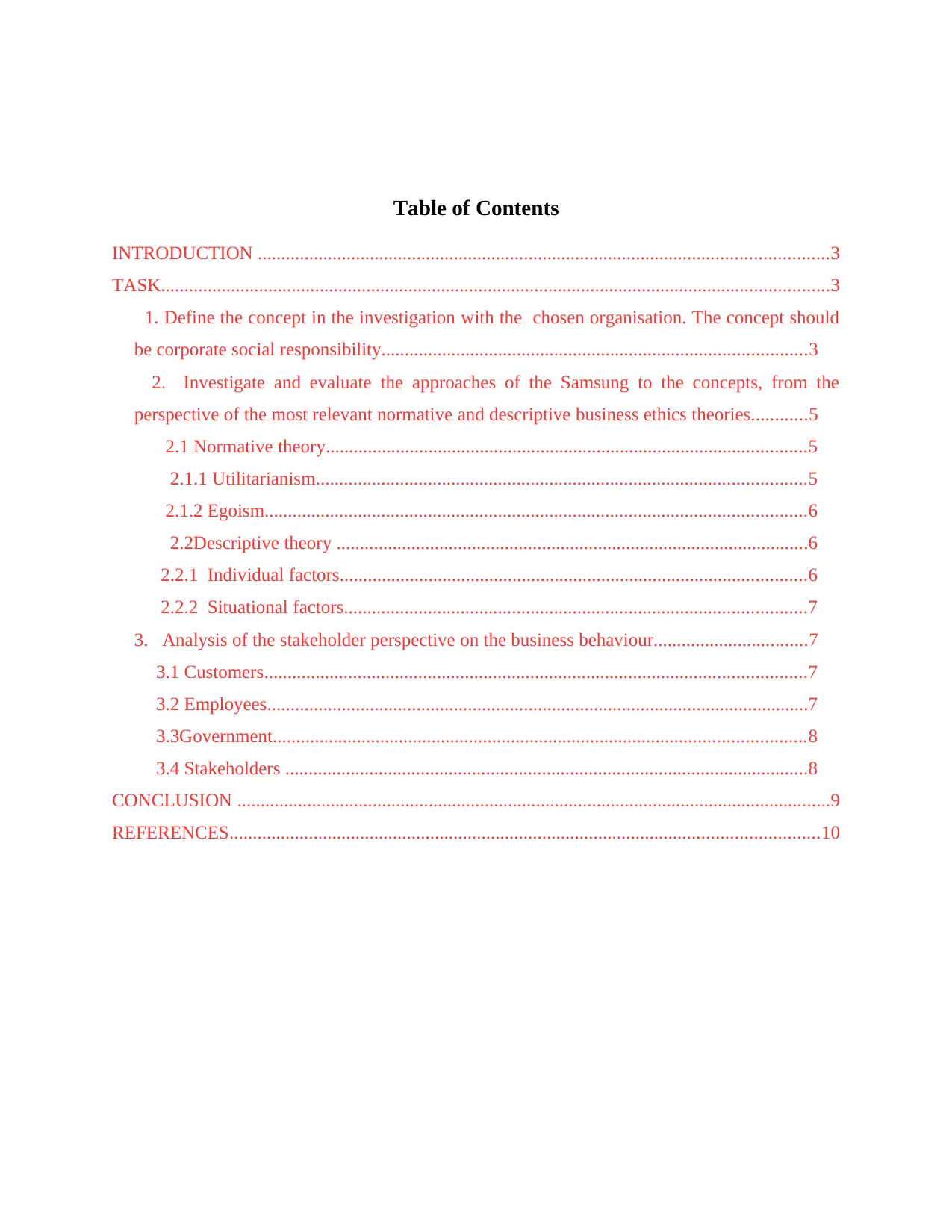
Table of Contents
INTRODUCTION ..........................................................................................................................3
TASK...............................................................................................................................................3
1. Define the concept in the investigation with the chosen organisation. The concept should
be corporate social responsibility...........................................................................................3
2. Investigate and evaluate the approaches of the Samsung to the concepts, from the
perspective of the most relevant normative and descriptive business ethics theories............5
2.1 Normative theory.......................................................................................................5
2.1.1 Utilitarianism.........................................................................................................5
2.1.2 Egoism....................................................................................................................6
2.2Descriptive theory .....................................................................................................6
2.2.1 Individual factors....................................................................................................6
2.2.2 Situational factors...................................................................................................7
3. Analysis of the stakeholder perspective on the business behaviour.................................7
3.1 Customers....................................................................................................................7
3.2 Employees....................................................................................................................7
3.3Government..................................................................................................................8
3.4 Stakeholders ................................................................................................................8
CONCLUSION ...............................................................................................................................9
REFERENCES..............................................................................................................................10
INTRODUCTION ..........................................................................................................................3
TASK...............................................................................................................................................3
1. Define the concept in the investigation with the chosen organisation. The concept should
be corporate social responsibility...........................................................................................3
2. Investigate and evaluate the approaches of the Samsung to the concepts, from the
perspective of the most relevant normative and descriptive business ethics theories............5
2.1 Normative theory.......................................................................................................5
2.1.1 Utilitarianism.........................................................................................................5
2.1.2 Egoism....................................................................................................................6
2.2Descriptive theory .....................................................................................................6
2.2.1 Individual factors....................................................................................................6
2.2.2 Situational factors...................................................................................................7
3. Analysis of the stakeholder perspective on the business behaviour.................................7
3.1 Customers....................................................................................................................7
3.2 Employees....................................................................................................................7
3.3Government..................................................................................................................8
3.4 Stakeholders ................................................................................................................8
CONCLUSION ...............................................................................................................................9
REFERENCES..............................................................................................................................10
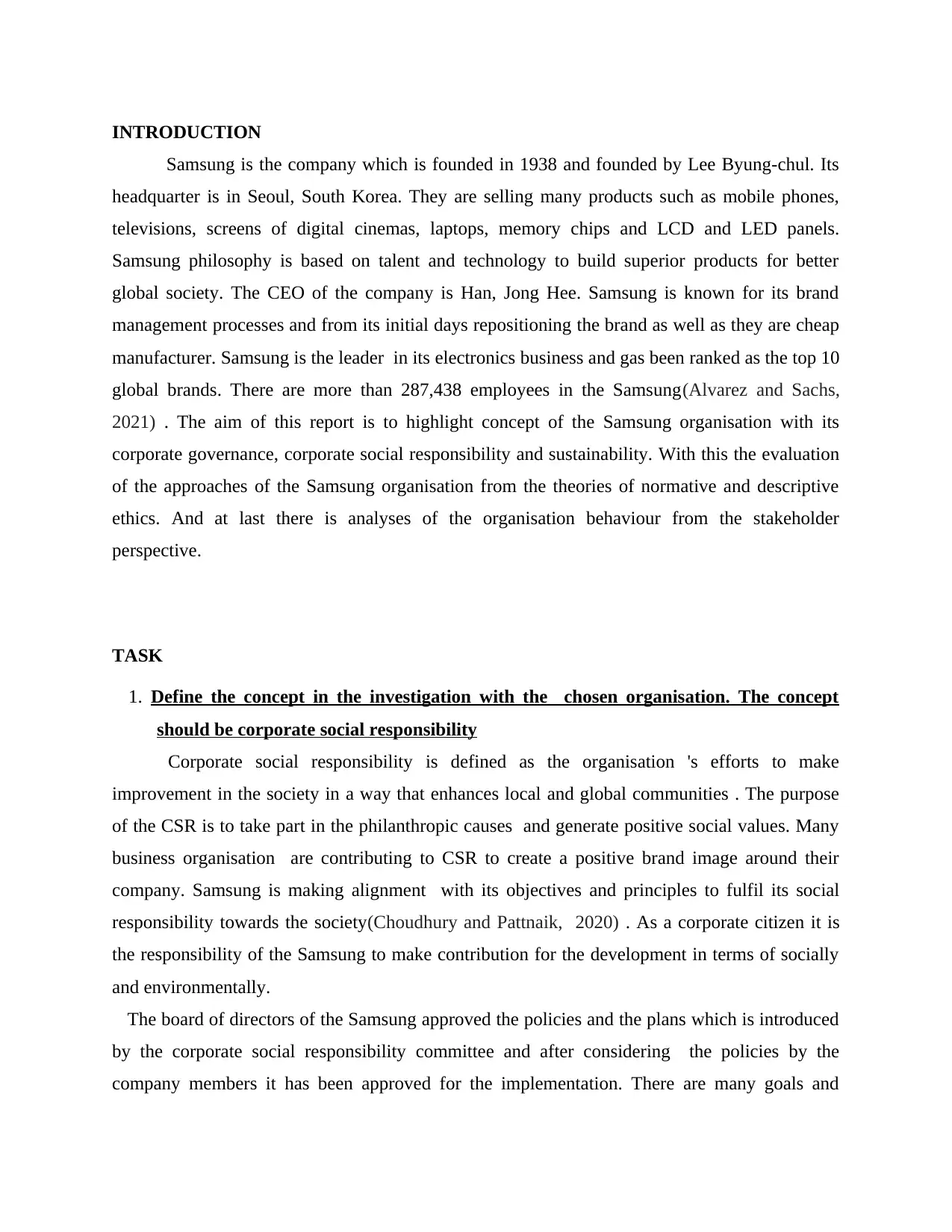
INTRODUCTION
Samsung is the company which is founded in 1938 and founded by Lee Byung-chul. Its
headquarter is in Seoul, South Korea. They are selling many products such as mobile phones,
televisions, screens of digital cinemas, laptops, memory chips and LCD and LED panels.
Samsung philosophy is based on talent and technology to build superior products for better
global society. The CEO of the company is Han, Jong Hee. Samsung is known for its brand
management processes and from its initial days repositioning the brand as well as they are cheap
manufacturer. Samsung is the leader in its electronics business and gas been ranked as the top 10
global brands. There are more than 287,438 employees in the Samsung(Alvarez and Sachs,
2021) . The aim of this report is to highlight concept of the Samsung organisation with its
corporate governance, corporate social responsibility and sustainability. With this the evaluation
of the approaches of the Samsung organisation from the theories of normative and descriptive
ethics. And at last there is analyses of the organisation behaviour from the stakeholder
perspective.
TASK
1. Define the concept in the investigation with the chosen organisation. The concept
should be corporate social responsibility
Corporate social responsibility is defined as the organisation 's efforts to make
improvement in the society in a way that enhances local and global communities . The purpose
of the CSR is to take part in the philanthropic causes and generate positive social values. Many
business organisation are contributing to CSR to create a positive brand image around their
company. Samsung is making alignment with its objectives and principles to fulfil its social
responsibility towards the society(Choudhury and Pattnaik, 2020) . As a corporate citizen it is
the responsibility of the Samsung to make contribution for the development in terms of socially
and environmentally.
The board of directors of the Samsung approved the policies and the plans which is introduced
by the corporate social responsibility committee and after considering the policies by the
company members it has been approved for the implementation. There are many goals and
Samsung is the company which is founded in 1938 and founded by Lee Byung-chul. Its
headquarter is in Seoul, South Korea. They are selling many products such as mobile phones,
televisions, screens of digital cinemas, laptops, memory chips and LCD and LED panels.
Samsung philosophy is based on talent and technology to build superior products for better
global society. The CEO of the company is Han, Jong Hee. Samsung is known for its brand
management processes and from its initial days repositioning the brand as well as they are cheap
manufacturer. Samsung is the leader in its electronics business and gas been ranked as the top 10
global brands. There are more than 287,438 employees in the Samsung(Alvarez and Sachs,
2021) . The aim of this report is to highlight concept of the Samsung organisation with its
corporate governance, corporate social responsibility and sustainability. With this the evaluation
of the approaches of the Samsung organisation from the theories of normative and descriptive
ethics. And at last there is analyses of the organisation behaviour from the stakeholder
perspective.
TASK
1. Define the concept in the investigation with the chosen organisation. The concept
should be corporate social responsibility
Corporate social responsibility is defined as the organisation 's efforts to make
improvement in the society in a way that enhances local and global communities . The purpose
of the CSR is to take part in the philanthropic causes and generate positive social values. Many
business organisation are contributing to CSR to create a positive brand image around their
company. Samsung is making alignment with its objectives and principles to fulfil its social
responsibility towards the society(Choudhury and Pattnaik, 2020) . As a corporate citizen it is
the responsibility of the Samsung to make contribution for the development in terms of socially
and environmentally.
The board of directors of the Samsung approved the policies and the plans which is introduced
by the corporate social responsibility committee and after considering the policies by the
company members it has been approved for the implementation. There are many goals and
⊘ This is a preview!⊘
Do you want full access?
Subscribe today to unlock all pages.

Trusted by 1+ million students worldwide
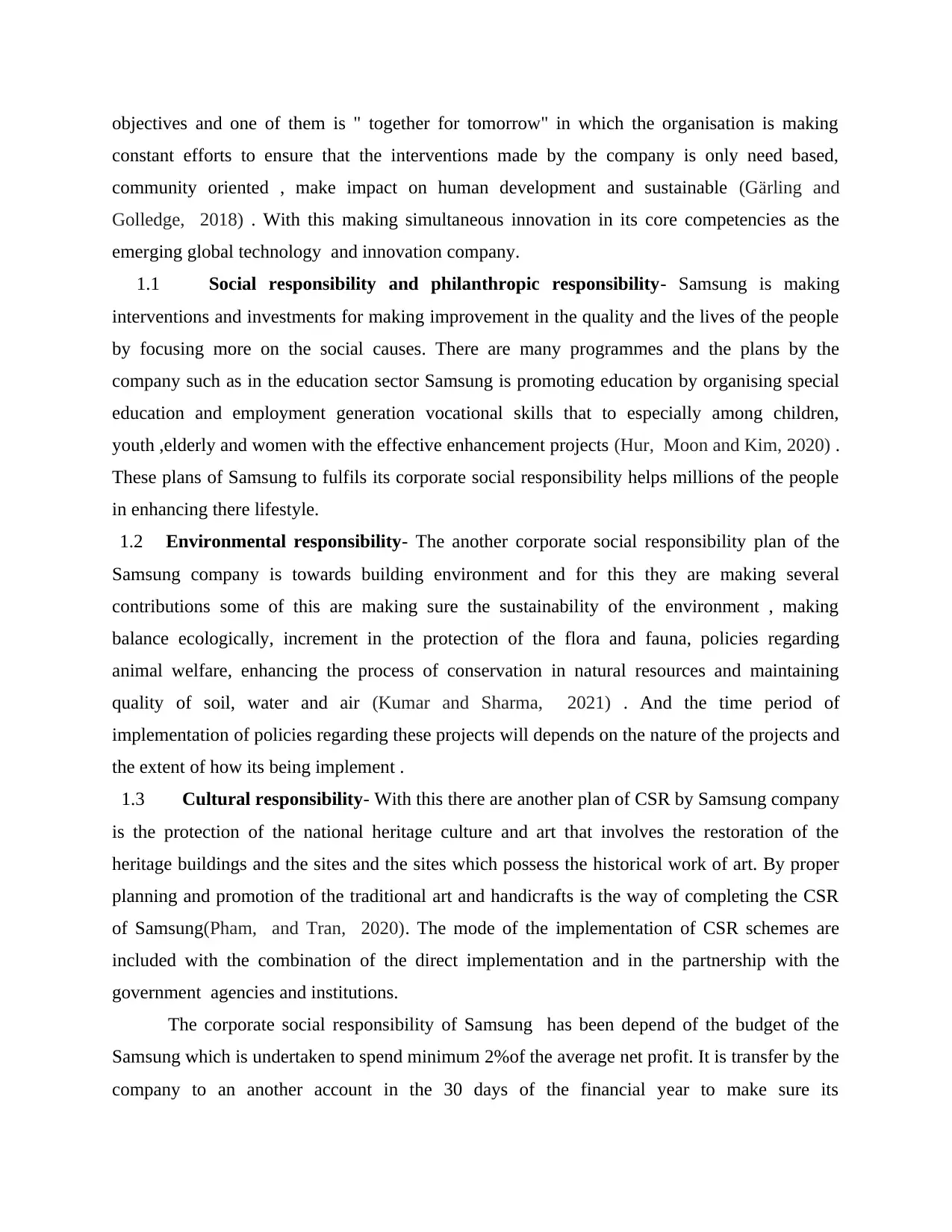
objectives and one of them is " together for tomorrow" in which the organisation is making
constant efforts to ensure that the interventions made by the company is only need based,
community oriented , make impact on human development and sustainable (Gärling and
Golledge, 2018) . With this making simultaneous innovation in its core competencies as the
emerging global technology and innovation company.
1.1 Social responsibility and philanthropic responsibility- Samsung is making
interventions and investments for making improvement in the quality and the lives of the people
by focusing more on the social causes. There are many programmes and the plans by the
company such as in the education sector Samsung is promoting education by organising special
education and employment generation vocational skills that to especially among children,
youth ,elderly and women with the effective enhancement projects (Hur, Moon and Kim, 2020) .
These plans of Samsung to fulfils its corporate social responsibility helps millions of the people
in enhancing there lifestyle.
1.2 Environmental responsibility- The another corporate social responsibility plan of the
Samsung company is towards building environment and for this they are making several
contributions some of this are making sure the sustainability of the environment , making
balance ecologically, increment in the protection of the flora and fauna, policies regarding
animal welfare, enhancing the process of conservation in natural resources and maintaining
quality of soil, water and air (Kumar and Sharma, 2021) . And the time period of
implementation of policies regarding these projects will depends on the nature of the projects and
the extent of how its being implement .
1.3 Cultural responsibility- With this there are another plan of CSR by Samsung company
is the protection of the national heritage culture and art that involves the restoration of the
heritage buildings and the sites and the sites which possess the historical work of art. By proper
planning and promotion of the traditional art and handicrafts is the way of completing the CSR
of Samsung(Pham, and Tran, 2020). The mode of the implementation of CSR schemes are
included with the combination of the direct implementation and in the partnership with the
government agencies and institutions.
The corporate social responsibility of Samsung has been depend of the budget of the
Samsung which is undertaken to spend minimum 2%of the average net profit. It is transfer by the
company to an another account in the 30 days of the financial year to make sure its
constant efforts to ensure that the interventions made by the company is only need based,
community oriented , make impact on human development and sustainable (Gärling and
Golledge, 2018) . With this making simultaneous innovation in its core competencies as the
emerging global technology and innovation company.
1.1 Social responsibility and philanthropic responsibility- Samsung is making
interventions and investments for making improvement in the quality and the lives of the people
by focusing more on the social causes. There are many programmes and the plans by the
company such as in the education sector Samsung is promoting education by organising special
education and employment generation vocational skills that to especially among children,
youth ,elderly and women with the effective enhancement projects (Hur, Moon and Kim, 2020) .
These plans of Samsung to fulfils its corporate social responsibility helps millions of the people
in enhancing there lifestyle.
1.2 Environmental responsibility- The another corporate social responsibility plan of the
Samsung company is towards building environment and for this they are making several
contributions some of this are making sure the sustainability of the environment , making
balance ecologically, increment in the protection of the flora and fauna, policies regarding
animal welfare, enhancing the process of conservation in natural resources and maintaining
quality of soil, water and air (Kumar and Sharma, 2021) . And the time period of
implementation of policies regarding these projects will depends on the nature of the projects and
the extent of how its being implement .
1.3 Cultural responsibility- With this there are another plan of CSR by Samsung company
is the protection of the national heritage culture and art that involves the restoration of the
heritage buildings and the sites and the sites which possess the historical work of art. By proper
planning and promotion of the traditional art and handicrafts is the way of completing the CSR
of Samsung(Pham, and Tran, 2020). The mode of the implementation of CSR schemes are
included with the combination of the direct implementation and in the partnership with the
government agencies and institutions.
The corporate social responsibility of Samsung has been depend of the budget of the
Samsung which is undertaken to spend minimum 2%of the average net profit. It is transfer by the
company to an another account in the 30 days of the financial year to make sure its
Paraphrase This Document
Need a fresh take? Get an instant paraphrase of this document with our AI Paraphraser
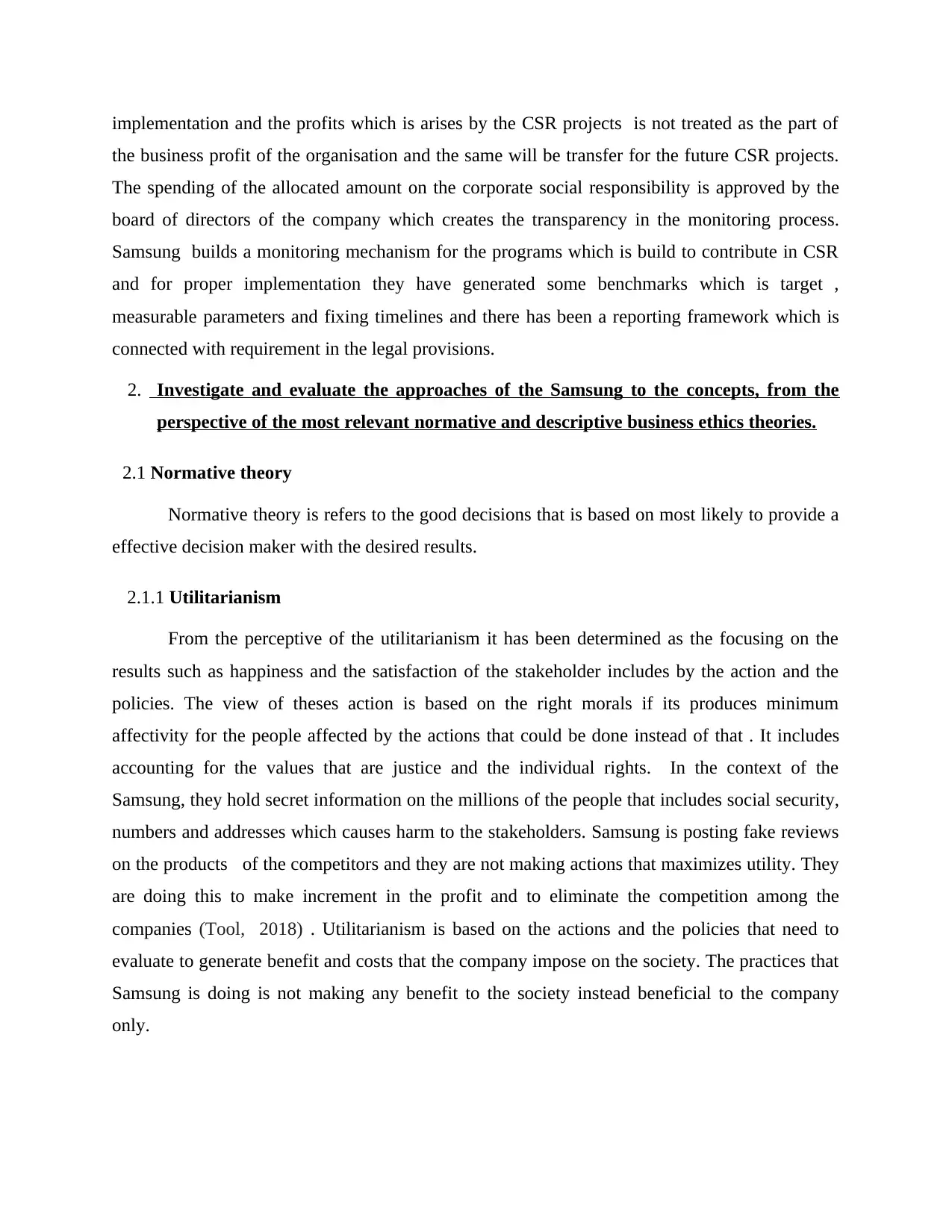
implementation and the profits which is arises by the CSR projects is not treated as the part of
the business profit of the organisation and the same will be transfer for the future CSR projects.
The spending of the allocated amount on the corporate social responsibility is approved by the
board of directors of the company which creates the transparency in the monitoring process.
Samsung builds a monitoring mechanism for the programs which is build to contribute in CSR
and for proper implementation they have generated some benchmarks which is target ,
measurable parameters and fixing timelines and there has been a reporting framework which is
connected with requirement in the legal provisions.
2. Investigate and evaluate the approaches of the Samsung to the concepts, from the
perspective of the most relevant normative and descriptive business ethics theories.
2.1 Normative theory
Normative theory is refers to the good decisions that is based on most likely to provide a
effective decision maker with the desired results.
2.1.1 Utilitarianism
From the perceptive of the utilitarianism it has been determined as the focusing on the
results such as happiness and the satisfaction of the stakeholder includes by the action and the
policies. The view of theses action is based on the right morals if its produces minimum
affectivity for the people affected by the actions that could be done instead of that . It includes
accounting for the values that are justice and the individual rights. In the context of the
Samsung, they hold secret information on the millions of the people that includes social security,
numbers and addresses which causes harm to the stakeholders. Samsung is posting fake reviews
on the products of the competitors and they are not making actions that maximizes utility. They
are doing this to make increment in the profit and to eliminate the competition among the
companies (Tool, 2018) . Utilitarianism is based on the actions and the policies that need to
evaluate to generate benefit and costs that the company impose on the society. The practices that
Samsung is doing is not making any benefit to the society instead beneficial to the company
only.
the business profit of the organisation and the same will be transfer for the future CSR projects.
The spending of the allocated amount on the corporate social responsibility is approved by the
board of directors of the company which creates the transparency in the monitoring process.
Samsung builds a monitoring mechanism for the programs which is build to contribute in CSR
and for proper implementation they have generated some benchmarks which is target ,
measurable parameters and fixing timelines and there has been a reporting framework which is
connected with requirement in the legal provisions.
2. Investigate and evaluate the approaches of the Samsung to the concepts, from the
perspective of the most relevant normative and descriptive business ethics theories.
2.1 Normative theory
Normative theory is refers to the good decisions that is based on most likely to provide a
effective decision maker with the desired results.
2.1.1 Utilitarianism
From the perceptive of the utilitarianism it has been determined as the focusing on the
results such as happiness and the satisfaction of the stakeholder includes by the action and the
policies. The view of theses action is based on the right morals if its produces minimum
affectivity for the people affected by the actions that could be done instead of that . It includes
accounting for the values that are justice and the individual rights. In the context of the
Samsung, they hold secret information on the millions of the people that includes social security,
numbers and addresses which causes harm to the stakeholders. Samsung is posting fake reviews
on the products of the competitors and they are not making actions that maximizes utility. They
are doing this to make increment in the profit and to eliminate the competition among the
companies (Tool, 2018) . Utilitarianism is based on the actions and the policies that need to
evaluate to generate benefit and costs that the company impose on the society. The practices that
Samsung is doing is not making any benefit to the society instead beneficial to the company
only.
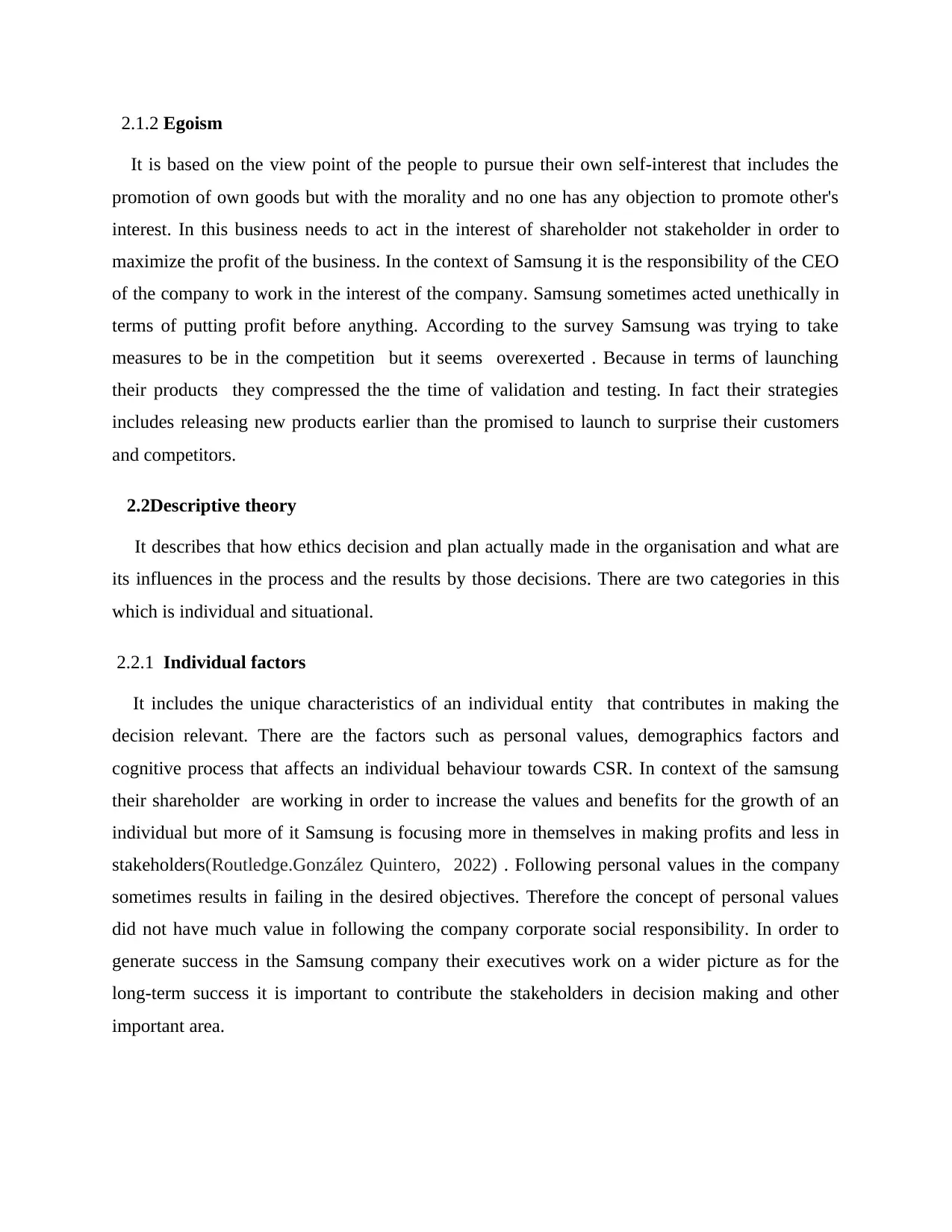
2.1.2 Egoism
It is based on the view point of the people to pursue their own self-interest that includes the
promotion of own goods but with the morality and no one has any objection to promote other's
interest. In this business needs to act in the interest of shareholder not stakeholder in order to
maximize the profit of the business. In the context of Samsung it is the responsibility of the CEO
of the company to work in the interest of the company. Samsung sometimes acted unethically in
terms of putting profit before anything. According to the survey Samsung was trying to take
measures to be in the competition but it seems overexerted . Because in terms of launching
their products they compressed the the time of validation and testing. In fact their strategies
includes releasing new products earlier than the promised to launch to surprise their customers
and competitors.
2.2Descriptive theory
It describes that how ethics decision and plan actually made in the organisation and what are
its influences in the process and the results by those decisions. There are two categories in this
which is individual and situational.
2.2.1 Individual factors
It includes the unique characteristics of an individual entity that contributes in making the
decision relevant. There are the factors such as personal values, demographics factors and
cognitive process that affects an individual behaviour towards CSR. In context of the samsung
their shareholder are working in order to increase the values and benefits for the growth of an
individual but more of it Samsung is focusing more in themselves in making profits and less in
stakeholders(Routledge.González Quintero, 2022) . Following personal values in the company
sometimes results in failing in the desired objectives. Therefore the concept of personal values
did not have much value in following the company corporate social responsibility. In order to
generate success in the Samsung company their executives work on a wider picture as for the
long-term success it is important to contribute the stakeholders in decision making and other
important area.
It is based on the view point of the people to pursue their own self-interest that includes the
promotion of own goods but with the morality and no one has any objection to promote other's
interest. In this business needs to act in the interest of shareholder not stakeholder in order to
maximize the profit of the business. In the context of Samsung it is the responsibility of the CEO
of the company to work in the interest of the company. Samsung sometimes acted unethically in
terms of putting profit before anything. According to the survey Samsung was trying to take
measures to be in the competition but it seems overexerted . Because in terms of launching
their products they compressed the the time of validation and testing. In fact their strategies
includes releasing new products earlier than the promised to launch to surprise their customers
and competitors.
2.2Descriptive theory
It describes that how ethics decision and plan actually made in the organisation and what are
its influences in the process and the results by those decisions. There are two categories in this
which is individual and situational.
2.2.1 Individual factors
It includes the unique characteristics of an individual entity that contributes in making the
decision relevant. There are the factors such as personal values, demographics factors and
cognitive process that affects an individual behaviour towards CSR. In context of the samsung
their shareholder are working in order to increase the values and benefits for the growth of an
individual but more of it Samsung is focusing more in themselves in making profits and less in
stakeholders(Routledge.González Quintero, 2022) . Following personal values in the company
sometimes results in failing in the desired objectives. Therefore the concept of personal values
did not have much value in following the company corporate social responsibility. In order to
generate success in the Samsung company their executives work on a wider picture as for the
long-term success it is important to contribute the stakeholders in decision making and other
important area.
⊘ This is a preview!⊘
Do you want full access?
Subscribe today to unlock all pages.

Trusted by 1+ million students worldwide
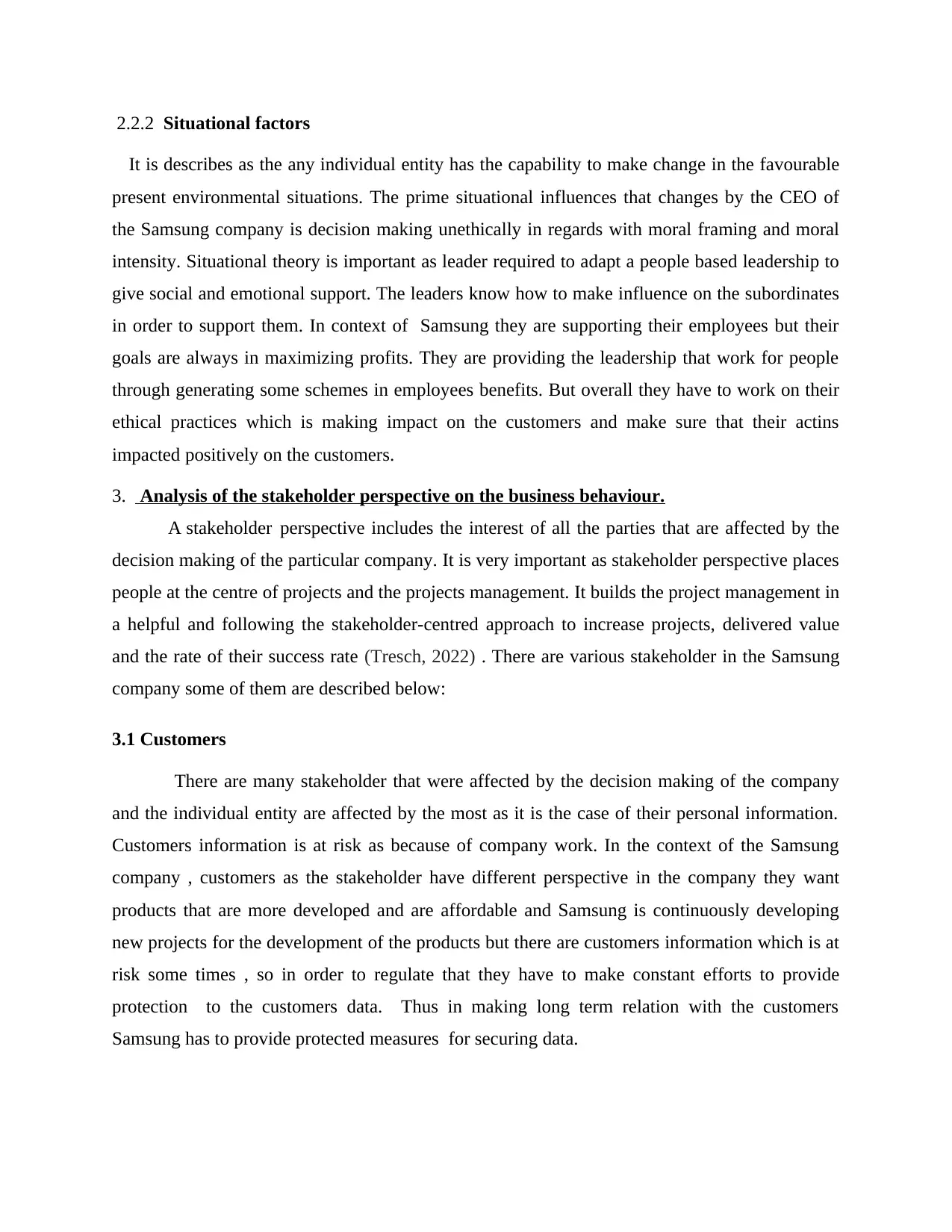
2.2.2 Situational factors
It is describes as the any individual entity has the capability to make change in the favourable
present environmental situations. The prime situational influences that changes by the CEO of
the Samsung company is decision making unethically in regards with moral framing and moral
intensity. Situational theory is important as leader required to adapt a people based leadership to
give social and emotional support. The leaders know how to make influence on the subordinates
in order to support them. In context of Samsung they are supporting their employees but their
goals are always in maximizing profits. They are providing the leadership that work for people
through generating some schemes in employees benefits. But overall they have to work on their
ethical practices which is making impact on the customers and make sure that their actins
impacted positively on the customers.
3. Analysis of the stakeholder perspective on the business behaviour.
A stakeholder perspective includes the interest of all the parties that are affected by the
decision making of the particular company. It is very important as stakeholder perspective places
people at the centre of projects and the projects management. It builds the project management in
a helpful and following the stakeholder-centred approach to increase projects, delivered value
and the rate of their success rate (Tresch, 2022) . There are various stakeholder in the Samsung
company some of them are described below:
3.1 Customers
There are many stakeholder that were affected by the decision making of the company
and the individual entity are affected by the most as it is the case of their personal information.
Customers information is at risk as because of company work. In the context of the Samsung
company , customers as the stakeholder have different perspective in the company they want
products that are more developed and are affordable and Samsung is continuously developing
new projects for the development of the products but there are customers information which is at
risk some times , so in order to regulate that they have to make constant efforts to provide
protection to the customers data. Thus in making long term relation with the customers
Samsung has to provide protected measures for securing data.
It is describes as the any individual entity has the capability to make change in the favourable
present environmental situations. The prime situational influences that changes by the CEO of
the Samsung company is decision making unethically in regards with moral framing and moral
intensity. Situational theory is important as leader required to adapt a people based leadership to
give social and emotional support. The leaders know how to make influence on the subordinates
in order to support them. In context of Samsung they are supporting their employees but their
goals are always in maximizing profits. They are providing the leadership that work for people
through generating some schemes in employees benefits. But overall they have to work on their
ethical practices which is making impact on the customers and make sure that their actins
impacted positively on the customers.
3. Analysis of the stakeholder perspective on the business behaviour.
A stakeholder perspective includes the interest of all the parties that are affected by the
decision making of the particular company. It is very important as stakeholder perspective places
people at the centre of projects and the projects management. It builds the project management in
a helpful and following the stakeholder-centred approach to increase projects, delivered value
and the rate of their success rate (Tresch, 2022) . There are various stakeholder in the Samsung
company some of them are described below:
3.1 Customers
There are many stakeholder that were affected by the decision making of the company
and the individual entity are affected by the most as it is the case of their personal information.
Customers information is at risk as because of company work. In the context of the Samsung
company , customers as the stakeholder have different perspective in the company they want
products that are more developed and are affordable and Samsung is continuously developing
new projects for the development of the products but there are customers information which is at
risk some times , so in order to regulate that they have to make constant efforts to provide
protection to the customers data. Thus in making long term relation with the customers
Samsung has to provide protected measures for securing data.
Paraphrase This Document
Need a fresh take? Get an instant paraphrase of this document with our AI Paraphraser
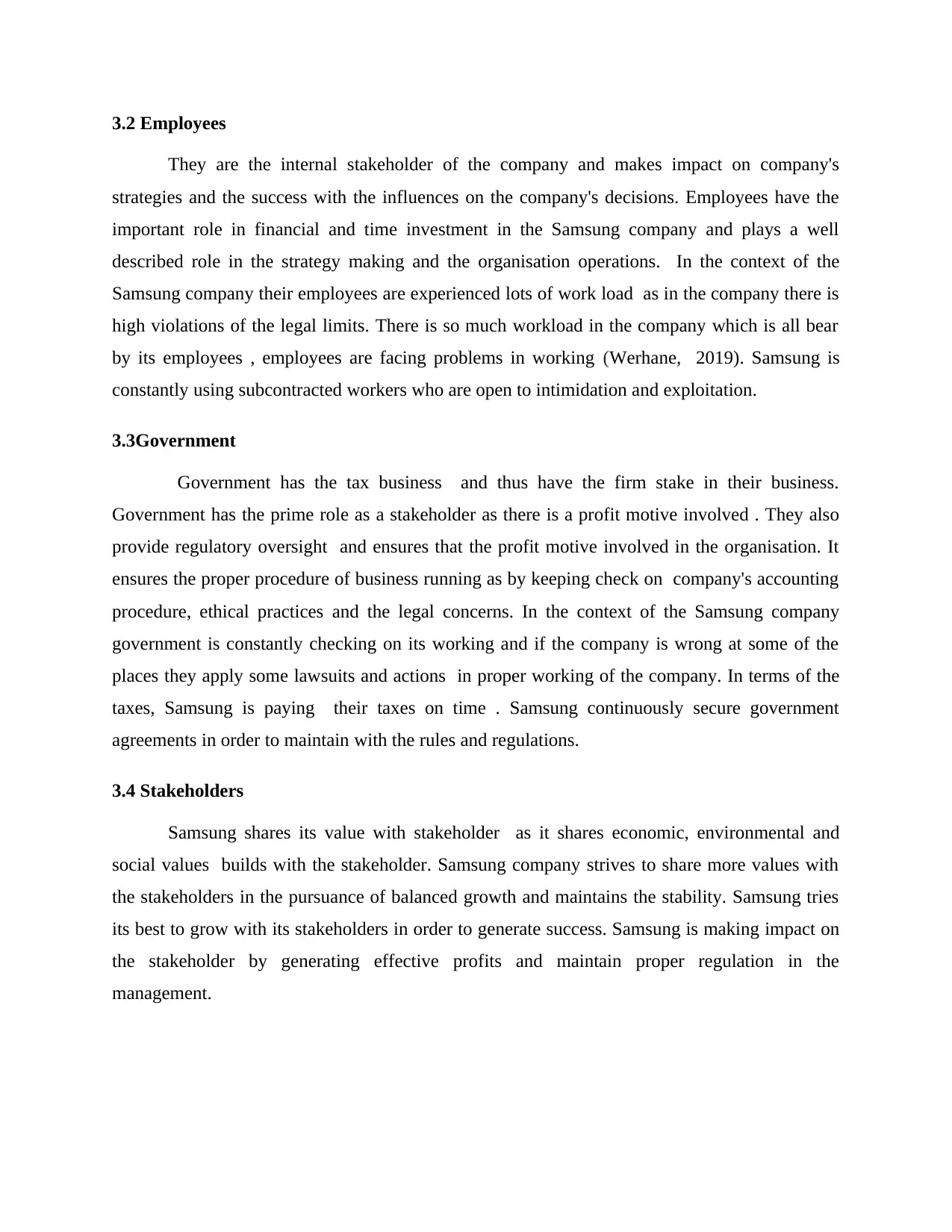
3.2 Employees
They are the internal stakeholder of the company and makes impact on company's
strategies and the success with the influences on the company's decisions. Employees have the
important role in financial and time investment in the Samsung company and plays a well
described role in the strategy making and the organisation operations. In the context of the
Samsung company their employees are experienced lots of work load as in the company there is
high violations of the legal limits. There is so much workload in the company which is all bear
by its employees , employees are facing problems in working (Werhane, 2019). Samsung is
constantly using subcontracted workers who are open to intimidation and exploitation.
3.3Government
Government has the tax business and thus have the firm stake in their business.
Government has the prime role as a stakeholder as there is a profit motive involved . They also
provide regulatory oversight and ensures that the profit motive involved in the organisation. It
ensures the proper procedure of business running as by keeping check on company's accounting
procedure, ethical practices and the legal concerns. In the context of the Samsung company
government is constantly checking on its working and if the company is wrong at some of the
places they apply some lawsuits and actions in proper working of the company. In terms of the
taxes, Samsung is paying their taxes on time . Samsung continuously secure government
agreements in order to maintain with the rules and regulations.
3.4 Stakeholders
Samsung shares its value with stakeholder as it shares economic, environmental and
social values builds with the stakeholder. Samsung company strives to share more values with
the stakeholders in the pursuance of balanced growth and maintains the stability. Samsung tries
its best to grow with its stakeholders in order to generate success. Samsung is making impact on
the stakeholder by generating effective profits and maintain proper regulation in the
management.
They are the internal stakeholder of the company and makes impact on company's
strategies and the success with the influences on the company's decisions. Employees have the
important role in financial and time investment in the Samsung company and plays a well
described role in the strategy making and the organisation operations. In the context of the
Samsung company their employees are experienced lots of work load as in the company there is
high violations of the legal limits. There is so much workload in the company which is all bear
by its employees , employees are facing problems in working (Werhane, 2019). Samsung is
constantly using subcontracted workers who are open to intimidation and exploitation.
3.3Government
Government has the tax business and thus have the firm stake in their business.
Government has the prime role as a stakeholder as there is a profit motive involved . They also
provide regulatory oversight and ensures that the profit motive involved in the organisation. It
ensures the proper procedure of business running as by keeping check on company's accounting
procedure, ethical practices and the legal concerns. In the context of the Samsung company
government is constantly checking on its working and if the company is wrong at some of the
places they apply some lawsuits and actions in proper working of the company. In terms of the
taxes, Samsung is paying their taxes on time . Samsung continuously secure government
agreements in order to maintain with the rules and regulations.
3.4 Stakeholders
Samsung shares its value with stakeholder as it shares economic, environmental and
social values builds with the stakeholder. Samsung company strives to share more values with
the stakeholders in the pursuance of balanced growth and maintains the stability. Samsung tries
its best to grow with its stakeholders in order to generate success. Samsung is making impact on
the stakeholder by generating effective profits and maintain proper regulation in the
management.
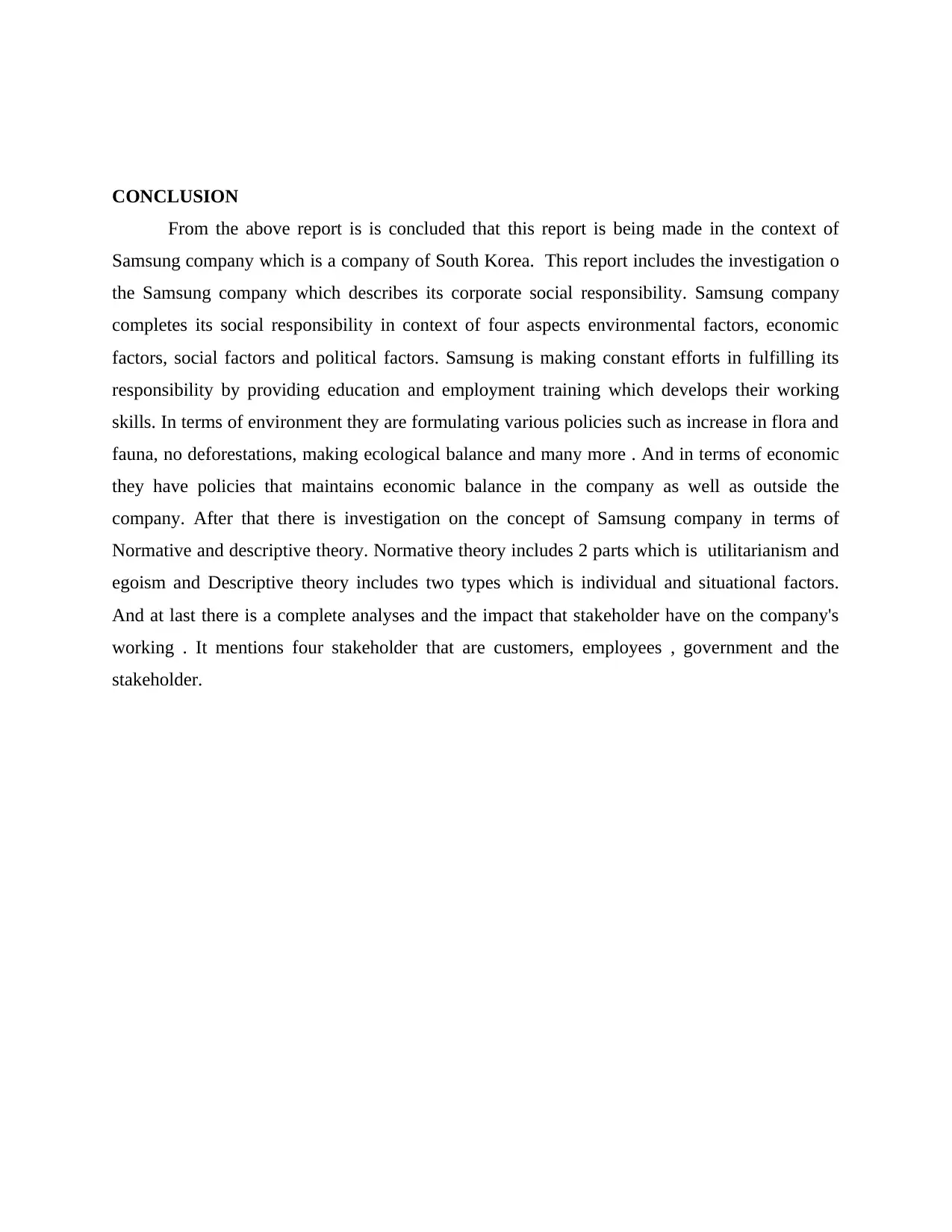
CONCLUSION
From the above report is is concluded that this report is being made in the context of
Samsung company which is a company of South Korea. This report includes the investigation o
the Samsung company which describes its corporate social responsibility. Samsung company
completes its social responsibility in context of four aspects environmental factors, economic
factors, social factors and political factors. Samsung is making constant efforts in fulfilling its
responsibility by providing education and employment training which develops their working
skills. In terms of environment they are formulating various policies such as increase in flora and
fauna, no deforestations, making ecological balance and many more . And in terms of economic
they have policies that maintains economic balance in the company as well as outside the
company. After that there is investigation on the concept of Samsung company in terms of
Normative and descriptive theory. Normative theory includes 2 parts which is utilitarianism and
egoism and Descriptive theory includes two types which is individual and situational factors.
And at last there is a complete analyses and the impact that stakeholder have on the company's
working . It mentions four stakeholder that are customers, employees , government and the
stakeholder.
From the above report is is concluded that this report is being made in the context of
Samsung company which is a company of South Korea. This report includes the investigation o
the Samsung company which describes its corporate social responsibility. Samsung company
completes its social responsibility in context of four aspects environmental factors, economic
factors, social factors and political factors. Samsung is making constant efforts in fulfilling its
responsibility by providing education and employment training which develops their working
skills. In terms of environment they are formulating various policies such as increase in flora and
fauna, no deforestations, making ecological balance and many more . And in terms of economic
they have policies that maintains economic balance in the company as well as outside the
company. After that there is investigation on the concept of Samsung company in terms of
Normative and descriptive theory. Normative theory includes 2 parts which is utilitarianism and
egoism and Descriptive theory includes two types which is individual and situational factors.
And at last there is a complete analyses and the impact that stakeholder have on the company's
working . It mentions four stakeholder that are customers, employees , government and the
stakeholder.
⊘ This is a preview!⊘
Do you want full access?
Subscribe today to unlock all pages.

Trusted by 1+ million students worldwide
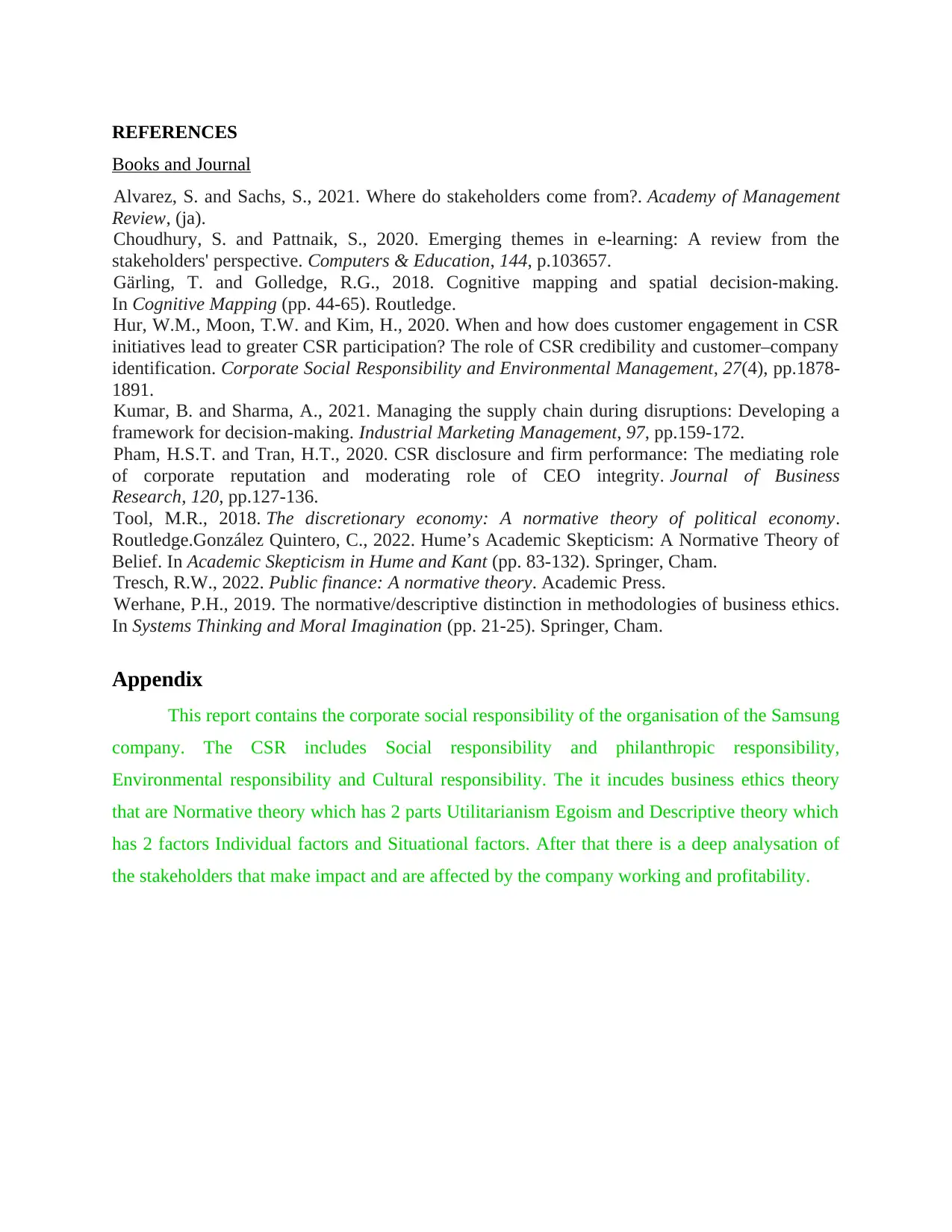
REFERENCES
Books and Journal
Alvarez, S. and Sachs, S., 2021. Where do stakeholders come from?. Academy of Management
Review, (ja).
Choudhury, S. and Pattnaik, S., 2020. Emerging themes in e-learning: A review from the
stakeholders' perspective. Computers & Education, 144, p.103657.
Gärling, T. and Golledge, R.G., 2018. Cognitive mapping and spatial decision-making.
In Cognitive Mapping (pp. 44-65). Routledge.
Hur, W.M., Moon, T.W. and Kim, H., 2020. When and how does customer engagement in CSR
initiatives lead to greater CSR participation? The role of CSR credibility and customer–company
identification. Corporate Social Responsibility and Environmental Management, 27(4), pp.1878-
1891.
Kumar, B. and Sharma, A., 2021. Managing the supply chain during disruptions: Developing a
framework for decision-making. Industrial Marketing Management, 97, pp.159-172.
Pham, H.S.T. and Tran, H.T., 2020. CSR disclosure and firm performance: The mediating role
of corporate reputation and moderating role of CEO integrity. Journal of Business
Research, 120, pp.127-136.
Tool, M.R., 2018. The discretionary economy: A normative theory of political economy.
Routledge.González Quintero, C., 2022. Hume’s Academic Skepticism: A Normative Theory of
Belief. In Academic Skepticism in Hume and Kant (pp. 83-132). Springer, Cham.
Tresch, R.W., 2022. Public finance: A normative theory. Academic Press.
Werhane, P.H., 2019. The normative/descriptive distinction in methodologies of business ethics.
In Systems Thinking and Moral Imagination (pp. 21-25). Springer, Cham.
Appendix
This report contains the corporate social responsibility of the organisation of the Samsung
company. The CSR includes Social responsibility and philanthropic responsibility,
Environmental responsibility and Cultural responsibility. The it incudes business ethics theory
that are Normative theory which has 2 parts Utilitarianism Egoism and Descriptive theory which
has 2 factors Individual factors and Situational factors. After that there is a deep analysation of
the stakeholders that make impact and are affected by the company working and profitability.
Books and Journal
Alvarez, S. and Sachs, S., 2021. Where do stakeholders come from?. Academy of Management
Review, (ja).
Choudhury, S. and Pattnaik, S., 2020. Emerging themes in e-learning: A review from the
stakeholders' perspective. Computers & Education, 144, p.103657.
Gärling, T. and Golledge, R.G., 2018. Cognitive mapping and spatial decision-making.
In Cognitive Mapping (pp. 44-65). Routledge.
Hur, W.M., Moon, T.W. and Kim, H., 2020. When and how does customer engagement in CSR
initiatives lead to greater CSR participation? The role of CSR credibility and customer–company
identification. Corporate Social Responsibility and Environmental Management, 27(4), pp.1878-
1891.
Kumar, B. and Sharma, A., 2021. Managing the supply chain during disruptions: Developing a
framework for decision-making. Industrial Marketing Management, 97, pp.159-172.
Pham, H.S.T. and Tran, H.T., 2020. CSR disclosure and firm performance: The mediating role
of corporate reputation and moderating role of CEO integrity. Journal of Business
Research, 120, pp.127-136.
Tool, M.R., 2018. The discretionary economy: A normative theory of political economy.
Routledge.González Quintero, C., 2022. Hume’s Academic Skepticism: A Normative Theory of
Belief. In Academic Skepticism in Hume and Kant (pp. 83-132). Springer, Cham.
Tresch, R.W., 2022. Public finance: A normative theory. Academic Press.
Werhane, P.H., 2019. The normative/descriptive distinction in methodologies of business ethics.
In Systems Thinking and Moral Imagination (pp. 21-25). Springer, Cham.
Appendix
This report contains the corporate social responsibility of the organisation of the Samsung
company. The CSR includes Social responsibility and philanthropic responsibility,
Environmental responsibility and Cultural responsibility. The it incudes business ethics theory
that are Normative theory which has 2 parts Utilitarianism Egoism and Descriptive theory which
has 2 factors Individual factors and Situational factors. After that there is a deep analysation of
the stakeholders that make impact and are affected by the company working and profitability.
1 out of 10
Related Documents
Your All-in-One AI-Powered Toolkit for Academic Success.
+13062052269
info@desklib.com
Available 24*7 on WhatsApp / Email
![[object Object]](/_next/static/media/star-bottom.7253800d.svg)
Unlock your academic potential
Copyright © 2020–2025 A2Z Services. All Rights Reserved. Developed and managed by ZUCOL.





